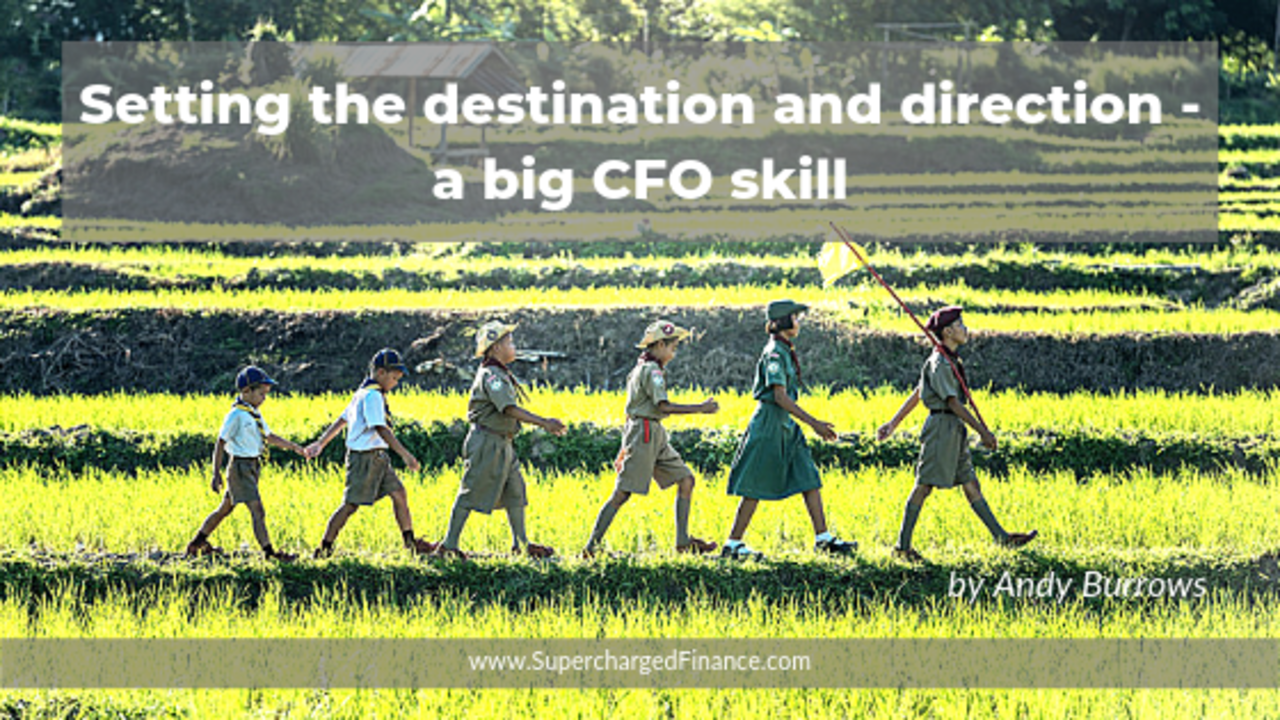Setting the destination and direction – a big CFO skill

By Andy Burrows
I’d like you come away from this article knowing how to get a clearer or renewed sense of direction.
Not only that, but I hope that you will have learnt some insights into how you can assess and define the direction you want to go in both your life and work.
Clearly, I write to Finance people, and I’m addressing this article to those who are somewhere on the continuum between Finance business partner and CFO or who want to embark on that journey. However, I’m going to be talking about principles that can be used in pretty much any walk of life or work.
The important context
This is the fourth article in a series. The first two establish the context.
So, I started by pointing out that Finance Business Partner is the new best route to a CFO role. In that article I was establishing the need to better define and support one of the most important development pathways post-accountancy.
Next, I outlined from recent literature and my own research and experience the three areas of skill needed to develop as a Finance business partner into a good CFO. Those three areas are:
- Technical
- Business acumen
- Behavioural
Last time, I homed in on just one of those skills areas, saying, Finance leadership and influence starts with this one simple thing.
Within the ‘behavioural’ category there is (I’m proposing) a critical component subcategory focused on what I’d call, “personal effectiveness”. You could also call it, “personal leadership”. The point is that if we’re eventually working up and out into to leadership skills, let’s start by developing our ability to lead ourselves.
The powerful starting point in that area is the skill of being able to use a “can do attitude” to choose to build new habits and intentionally grow. And I gave some simple tips to get started. Please do go back and read that if you possibly can.
Today and over the coming weeks, I want to talk some more under this “personal effectiveness” heading.
Great CFOs are about direction and destination
This time, having discovered we have the power of choice and can develop our ability to intentionally change and grow, we turn our attention to what guides our choices. This is the skill and discipline of “destination and direction”.
And this is the essence of leadership.

Just quickly first, though, why do I say that Finance business partners have to start developing these skills? Two reasons:
- It takes 10 years (as I mentioned in my last article) to become expert in a complex skill, and that includes leadership. So, it’s best to get started as early as possible!
- I believe that Finance business partners are called to influence business decisions to a large extent. That, in my book, makes them leaders. And experienced leadership coach, Penny Ferguson, agrees: “Being a leader, in its broadest context, is about recognising that the minute you influence another person you are, in fact, leading.” (Transform Your Life, p117)
But back to the point!
If we see our actions each day, the actions of our teams and our employers, the businesses we work for, as moving us somewhere, achieving something, we have a choice. We can either choose where to head or what we try to achieve, or we can just carry on and see where we end up.
Which would you rather do? Choose the destination or wonder where you are when you get there?
Leadership is choosing the direction and destination. (If you want a contrast with management, management is organising the work to effectively follow the direction and get to the destination.)
Leaders start with themselves
So, let’s look at this on a personal level first.
This is important – firstly, because you must become credible in leading yourself before other people will let you lead them.
But, secondly, because to be a great leader you need to develop a habitual way of thinking in terms of direction. The purpose, the destination, the direction, becomes the way you think, the filter you use on every decision.
So, come on then, personally speaking, where are you heading? Where do you want to end up?
Many people will immediately think about their dream house, becoming a CFO (if they’re not one already), having lots of money, holidays and things.
But many of these things are so short term. What happens when you get to that destination? Are you seriously going to set another destination, and go through your life aiming to accumulate more and more stuff? What will that look like? Imagine it! Will you be happy? Will your family be happy?
Thinking forward towards the end of your life, long after you’ve retired, imagine a dinner in your honour. What would be particularly pleasing to hear them say?
“Here’s Johnny. He’s great! He’s got 14 Ferraris and a yacht!”?
Or, “Here’s Johnny. He’s great! He has such a good heart, always has time for people, and is such an encouragement to people going through illness.”?
Where does your motivation come from?
Part of what this question does is to make you think about what your values are – the source of your security, your guiding principles, your source of motivation, wisdom and strength.
In other words, the most satisfying goals are about being, not having. And it turns out they’re most empowering.
Stephen Covey said, “The key to the ability to change is a changeless sense of who you are, what you are about and what you value.” (The 7 Habits of Highly Effective People, p108).
But here’s the thing. There are lots of things that may be functioning at our core to motivate us and affect our sense of security, guidance, wisdom and strength. Even these shouldn’t be accepted uncritically.
For example, imagine a woman who gets her security, guidance and strength from her husband. She does everything she can to be what she considers to be a “good wife”, even giving up a good job to be there for him and their kids. That’s part of her core values, to be a “good wife”. And suddenly he lets her down in a big way. That’s going to be devastating. So much for security and strength!
Or, for example, imagine someone who is all about “being the best” at their job. They pour all their energy into their job, to the neglect of their family. And then they get laid off. Devastating again.
And in both cases, it’s unbalanced.

Unfortunately, I haven’t got the time to develop this fully.
But it must be clear by now that this whole area is one where it’s worth getting really analytical and intentional. You want to understand where your motivation is coming from, what your core values are, and how they balance in each of the areas of your life...
... and then decide what your core values really should be based on.
The Finance business partnering destination
So, let’s come back to talking about Finance business partnering skills and Finance leadership.
Finance leaders, CFOs and influencers can apply their “destination and direction” skills in very practical ways.
There’s a couple of levels.
Firstly, there’s the day-to-day level. This is what my series of articles, The Purpose-driven CFO, is all about.
It’s saying, practically, in everything we do in Finance, let’s recognise why we’re doing things. Let’s look at what we’re aiming at, and make sure that what we’re doing actually gets us there effectively.
But secondly, there’s our organisational purpose and mission. Rather than leaving this to chance, we should be intentional and explicit about it.
And this means not only does a good CFO get the team to help put together a mission/vision statement for Finance. It also means Finance business partners, Finance leaders and CFOs, knowing about the purpose and mission of each of the business component parts, and the business as a whole.
We should be thinking naturally in terms of purpose, mission, strategy and vision. These should be the bedrock of the insights and influence we provide in the business. And therefore, we should be developing the skills to think in this way – part of our “personal effectiveness” behavioural skills.
The skills to set the destination
Just to finish off with, let’s think of what the skills actually involve that enable you to think in terms of destination and direction.
The skill of thinking in this way involves being both analytical and doing some visualisation (using your imagination) and creativity.
As trained accountants, we’re not usually wired early on to be creative. Some of us are, obviously (I was a musician and songwriter before I was an accountant!). But if we’ve put a lot of time and effort into learning a load of accounting techniques and facts, then we probably haven’t developed thorough creative skills.
Have you heard about “left-brain” and “right-brain” thinking?
Left-brain thinking is very analytical and methodical. Right-brain thinking is thinking in a more holistic way, more creatively and artistically.
Every human being cannot help using both sides, apparently. But, initially as we grow up, some of us develop one side more than the other.
The trick is to get both sides working together. And looking forward, plotting a destination, analysing core values and motivations, and so on, involves applying both analytical and creative skills.
So, in conclusion, if we’re going to be effective leaders/influencers, we have to get some practice at being creative, using our imagination (and analysis) skills to look forward and within for the right direction.
Three quick ways you can get the practice you need to become more creative are:
- Writing a daily journal;
- Going somewhere quiet and meditating, visualising something in the future or in a different location;
- Playing brain games, even ones you get on smartphone apps!
Where next with Finance business partnering skills?
So, as we’re getting into “personal effectiveness” as a Finance business partnering skill area, we’ve started from the powerful entry point of the “can do” attitude and the skills to effect personal change and build new habits.
This time we’ve seen that we need to develop creativity and imagination in order to find our motivating forces and think in terms of destination and direction.
In the next article, I cover the next critical piece of “personal effectiveness”.
That is, “focus”. Take a look now if you want!
Related Posts
Finance leadership and influence starts with this one simple thing
If you want to be a CFO, develop these three skills...
Why Finance business partner is the new best route to a CFO role
How to go from accountant to Finance business partner... even if the thought scares you
Free downloads available
I've put all the articles from this series into a book which you can buy on Amazon ... but you can also get the pdf download version of the book free by clicking the link below:
An introduction to personal effectiveness for CFOs and Finance professionals
And also worth having a look at:
Stay connected with news and updates!
Join our mailing list to receive the latest news and updates on new resources to help you make your Finance role add value in the business you work for
[Your information will not be shared with external parties for anything other than the provision of Supercharged Finance products and services.]





